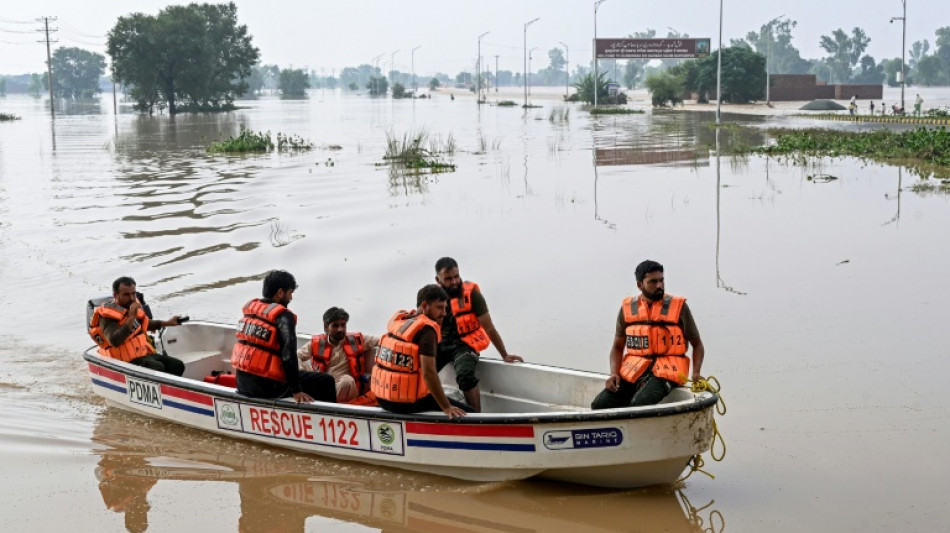

'Ruins': Pakistan's Punjab reels from flood surge
Orange-vested rescue teams rowed through streets transformed into muddy rivers in Pakistan's Punjab province on Thursday, helping to pluck people and their livestock from flooded villages.
Water has gushed into the eastern province, Pakistan's breadbasket and home to about half of its 255 million people, with three transboundary rivers swelling beyond their banks.
The latest monsoon downpour has killed at least 13 people, according to the National Disaster Management Authority.
More than 1.4 million people living near the rivers have been affected by the floods, with over 265,000 evacuated, said Azma Bukhari, the provincial information minister.
In the city of Wazirabad, the receding fetid tide left behind mud, buzzing insects and the threat of disease.
Mother-of-four Nazia Nasir told AFP the army evacuated her family, who found their house collapsed upon their return.
"Everything we owned is lying in ruins," the 40-year-old said, clearing the mud away with her bare hands.
"My son has nothing to wear, he walks around in just a T-shirt. The crops we relied on for our livelihood are gone."
Nasima Bibi was not yet able to return to her submerged home, camping on higher ground on the roadside.
"I don't know what I will find but I have no other place to go. The sun has burnt my skin but I cannot leave," she said.
People living in the washed out area around an ancient Sikh temple in Kartarpur said no officials came to assist them, with the relief effort sporadic and some stranded in their homes as the waterline rose.
"Many homes were washed away and many people lost their cattle, roads were also ruined," Muhammad Asad Imam told AFP.
"People were given no boat in the area and confined to their houses."
Villager Rana Mubashir told AFP authorities rescued people in the Kartarpur temple complex, while the surrounding villagers begged for help.
"It's been three days since our area was flooded, but no official team has reached this area," he said.
"Our children had no milk or anything to eat or drink."
Nearby, men waded through waist-high stagnant brown water that filled the sprawling Kartarpur temple complex, where founder of the Sikh faith Guru Nanak is said to have died in 1539.
This year, landslides and floods triggered by heavy monsoon rains have killed more than 800 people countrywide since June.
While South Asia's seasonal monsoon brings rainfall that farmers depend on, climate change is making the phenomenon more erratic, unpredictable and deadly across the region.
Touring the flood-affected areas on Thursday, Prime Minister Shehbaz Sharif emphasised the country's vulnerability to climate change-fuelled disasters.
Pakistani authorities have said spillover released from dams in neighbouring India increased the flow of water rushing downstream to Punjab.
(L.Fourie--TPT)




